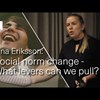outline
Is conservative opposition to climate change threat-based? Articulating an integrated threat model of climate change attitudes
British Journal of Social Psychology Abstract Throughout the literature, there are assertions that those endorsing conservative ideologies reject the science and solutions of climate change due to perce
Putting costs and benefits of ordeals together
Economics and Philosophy 37 Abstract This paper addresses how to think about the permissibility of introducing deadweight costs (so-called ‘ordeals’) on candidate recipients of goods in order to attain b
Private Financing of Elder Care in Sweden. Arguments for and Against
This paper outlines recent developments in private provision of elder care services and examines arguments and actors for increasing private financing, both supportive and dissenting. The purpose is t
Expert deference as a belief revision schema
in Synthese (2020) AbstractWhen an agent learns of an expert’s credence in a proposition about which they are an expert, the agent should defer to the expert and adopt that credence as their own. This
Collective behaviour and collective cognition
Jens Krause, Humboldt University, Berlin In his talk Krause will explain some of the basic principles of collective behaviour and collective cognition. Some of the case studies are based on experiments
Population Geography Perspectives on the Central Asian Republics
The main traits of the population geography of the Central Asian Republics of Kazakhstan, Kyrgyzstan, Tajikistan, Turkmenistan and Uzbekistanare are outlined, and attempts are made to establish if par
Lina Eriksson: Changing social norms – what levers can we pull?
Venue:Institute for Futures Studies, Holländargatan 13 in Stockholm Research seminar with Lina Eriksson, professor of political science at the University of Gothenburg. Register here > Abstract Social makelevers to pull

Lina Eriksson: Changing social norms - what levers can we pull?
Research seminar with Lina Eriksson, professor of political science at the University of Gothenburg. Social norms affect us in almost all aspects of our lives, whether we comply with them, choose to v
What can be understood, what can be compared, and what counts as context? Studying lawmaking in world history
In: Arne Jarrick, Janken Myrdal, Maria Wallenberg-Bondesson (eds.). Methods in world history. A critical approach. Lund: Nordic Academic Press. Methods in World Historyis the first international volume
Epistemic Privilege and Victims’ Duties to Resist their Oppression
Journal of Applied Philsophy, DOI: 10.1111/japp.12255. Abstract Victims of injustice are prominent protagonists in efforts to resist injustice. I argue that they have a duty to do so. Extant accounts of








